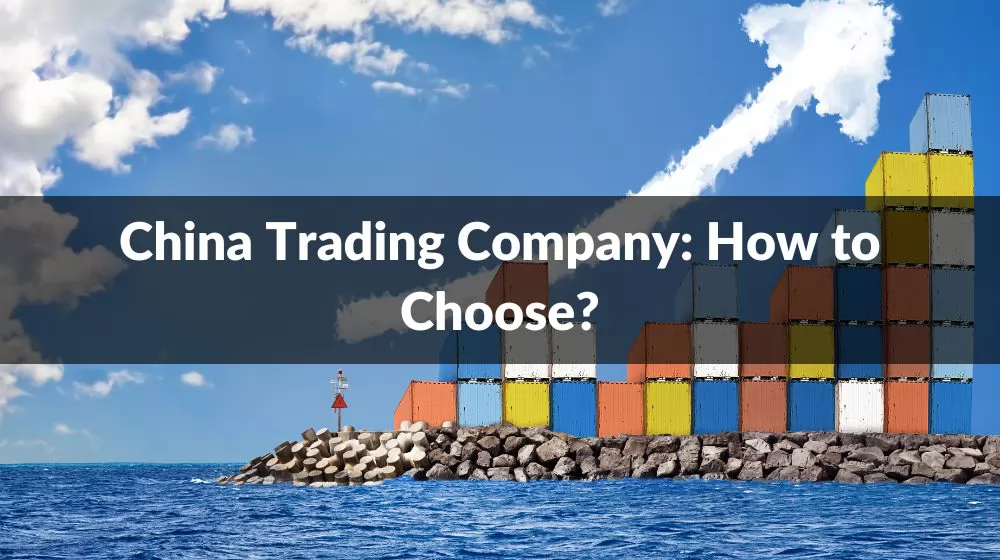
Table of contents:
In the complex landscape of international trade, selecting the right trading company is a critical decision, particularly when dealing with a market as dynamic and diverse as China. The choice of a trading partner can significantly impact the success of your business endeavors. From facilitating transactions to navigating cultural nuances, a well-chosen trading company can serve as a strategic ally, streamlining processes and opening doors to opportunities. This article explores key considerations and guidelines on how to navigate the selection process when choosing a China trading company, ensuring that your business ventures are not only successful but also aligned with your long-term objectives.
What Is A Trading Company?
A trading company serves as an intermediary between manufacturers and buyers, facilitating the exchange of goods across international borders. In the context of China, trading companies play a crucial role in the vast and dynamic landscape of international trade. These entities essentially act as intermediaries that connect foreign businesses with Chinese manufacturers, enabling smoother transactions and mitigating some of the challenges associated with cross-border commerce.
Importance of Choosing the Right Trading Company
Selecting the right trading company is a pivotal decision that can significantly impact the success of your international business endeavors, particularly when dealing with China. The importance of choosing the right trading company cannot be overstated, and several key factors highlight why this decision is crucial.
Reliability and Trust:
Entrusting your international trade activities to a trading company requires a high level of trust. The right trading partner should be reliable and possess a solid reputation for ethical business practices. This is especially important when considering the significant financial transactions and the exchange of sensitive business information that often accompany international trade.
Market Knowledge and Expertise:
A well-established trading company with a deep understanding of the Chinese market can provide invaluable insights. The right partner should be familiar with industry trends, market dynamics, and regulatory changes, enabling them to offer strategic advice and enhance your decision-making process.
Reduced Operational Challenges:
Choosing a trading company that efficiently manages logistics, customs clearance, and other operational aspects can streamline your supply chain. This reduces the administrative burden on your end, allowing you to focus on core business activities while ensuring a smoother flow of goods.
Product Quality Assurance:
Quality control is a critical aspect of international trade. The right trading company should have robust processes in place to ensure the quality and compliance of the products you are importing or exporting. This is essential for maintaining your brand reputation and meeting the expectations of your customers.
Negotiation Skills and Cost Efficiency:
An experienced trading partner possesses effective negotiation skills that can lead to cost savings and favorable terms. Choosing a company with a track record of securing competitive prices, flexible payment terms, and other favorable conditions can positively impact your bottom line.
Customized Solutions:
Every business has unique requirements, and the right trading company should be able to provide customized solutions tailored to your specific needs. Whether it's adapting to changing market conditions or addressing specific logistical challenges, a flexible and adaptable trading partner adds significant value.
Risk Management:
International trade involves inherent risks, including regulatory compliance, currency fluctuations, and geopolitical uncertainties. A reputable trading company can assist in navigating these risks by staying informed about legal requirements, providing risk assessment, and offering strategies to mitigate potential challenges.
Long-Term Partnership Potential:
Building a long-term relationship with a trading company offers stability and consistency in your international trade activities. The right partner should be willing to invest in the success of your business, fostering a collaborative and enduring partnership.

Types of China Trade Company
There are eight different types of China trade companies, including:
Sourcing company
Sourcing trading companies act as a bridge between the end customer and the manufacturer. The company purchases, monitors, inspects, and ships products to their destination. Intermediaries simplify the purchase of products by arranging high-quality products on behalf of customers.
Hong Kong Trading Companies
Hong Kong is once known as the hub of manufacturing units, but in the late ’80s, most of the manufacturing process shifted to the mainland. Even though the manufacturing units have been shifted, the trading companies have their offices in Hong Kong. Most of these companies have formed large joint manufacturing ventures that operated from Malaysia, Cambodia, Vietnam, and China.
Factory Group Trading Companies
Comparing multiple manufacturing units producing various types of products, factory group trading companies provide quality and variety. Different Chinese companies joined together to form a single large manufacturing unit to simplify invoicing and export procedures in the form of this business setup.
Combined Manufacturer And Trading Company
In this trading setup, the company undertakes the production control and produces the goods, and then supplies them to the end customer. The trading company utilizes its own resources to produce the goods and handle the trading.
A Certain-filed Trading Company
Trading companies do offer competitive prices as compared to manufacturing units. In the certain-filed trading company set up, the company prefers a specific niche and focuses its entire efforts there. The company chose a team of trained, professional, and experienced individuals and offered competitive pricing to the clients.
Grocery-type Trading Company
Trading companies do offer competitive prices compared to manufacturing units. In setting up a trading company in a specific field, the company prefers a specific niche market and focuses its entire energy in that field. The company has selected a well-trained, professional, and experienced team and offers customers competitive prices.
Hot-selling Type Trading Company
As the name suggests, such a trading company has a strong interest in the hot products in the market. The company first identifies products through in-depth market and trend research and then arranges manufacturing cells. They make quick money by selling products that are more in demand in the market because as demand falls, they quickly switch to another product.
Soho China Trade Company
It is an abbreviation of a small office or small home, where a trading company initiates the business practice with a minimum number of people. For starting a Soho company, you need first to register your company and make an account at Alibaba and voila.
What You Need to Know About Working with Chinese Companies
Working with Chinese companies can be a rewarding experience, given the vast opportunities presented by China's dynamic and rapidly growing market. However, it's essential to navigate this business landscape with cultural awareness, understanding of business practices, and a strategic approach. Here are key considerations for businesses looking to collaborate with Chinese companies:
Cultural Sensitivity:
Understanding Chinese culture is fundamental to successful collaboration. Respect for traditions, communication styles, and business etiquette is crucial. Building relationships often involves face-to-face meetings, and cultivating a strong personal connection is highly valued in Chinese business culture.
Building Guanxi (Relationships):
Guanxi, or interpersonal relationships, plays a significant role in Chinese business. Establishing and nurturing relationships with key stakeholders is essential for long-term success. Networking events, dinners, and social gatherings are common ways to build guanxi.
Communication Styles:
Chinese communication may be indirect, emphasizing harmony and avoiding confrontation. It's important to read between the lines, listen actively, and pay attention to non-verbal cues. Clarifying expectations and ensuring mutual understanding is vital for effective communication.
Patience and Long-Term Perspective:
Business relationships in China often develop slowly. Patience is a virtue, and a long-term perspective is key. Building trust takes time, and successful collaborations are built on a foundation of mutual understanding and respect.
Legal and Regulatory Landscape:
Familiarize yourself with the legal and regulatory environment in China. Compliance with local laws, licensing requirements, and business registration procedures is crucial. Engaging legal counsel with expertise in Chinese business law is advisable.
Intellectual Property Protection:
Intellectual property (IP) protection is a critical concern. Ensure that your patents, trademarks, and other IP rights are well-defined and legally protected in China. Working with reputable partners and consulting legal experts can help safeguard your intellectual assets.
Due Diligence:
Conduct thorough due diligence before entering into any business relationship. Verify the credentials, financial stability, and reputation of potential partners. Site visits, reference checks, and a comprehensive understanding of their business operations are essential steps.
Negotiation Strategies:
Negotiations in China may involve building consensus over time. Be prepared for patient, iterative discussions. Clearly articulate your expectations and understand those of your Chinese counterparts. Seek win-win solutions that benefit both parties.
Language Considerations:
While English is widely used in international business, language barriers can still exist. Having bilingual communication, either through language proficiency or interpreters, can facilitate smoother interactions.
Understanding Hierarchical Structures:
Chinese companies often have hierarchical structures, and decisions may be made at higher levels of management. Respect for authority and an understanding of the decision-making process are important for effective collaboration.
Adapting to Local Business Practices:
Embrace flexibility in your approach and be open to adapting to local business practices. Understanding the market dynamics, customer behaviors, and industry norms will contribute to the success of your business in China.

Understanding Your Business Needs
Understanding your business needs is a multifaceted process critical to shaping a successful strategy and achieving long-term objectives. Begin by clearly defining your business mission and objectives, providing a guiding principle for all activities. Delve into market analysis, identifying trends, competition, and potential opportunities or challenges. Conduct a SWOT analysis to assess internal strengths and weaknesses, external opportunities, and threats. Evaluate the financial health of your business, considering revenue streams, costs, and profitability for effective financial planning. Examine operational processes for efficiency gains and address technology needs to optimize operations and support growth.
Assess human resource requirements, investing in recruitment, training, and talent development to build a capable and motivated team. Listen to customer feedback, adapting products, services, and experiences based on their preferences and needs. Ensure compliance with regulations and industry standards, mitigating potential legal issues. Identify and manage risks, developing proactive strategies and contingency plans. Foster a culture of adaptability and innovation within the organization, acknowledging the need for continuous evolution in response to changing market dynamics and technological advancements. Regularly reassess your business needs to stay agile and responsive, creating a solid foundation for sustained growth and success.
Evaluating Services Offered
Evaluating the services offered is a crucial step in making informed decisions for your business. Whether you are considering partnerships, outsourcing, or engaging with service providers, a thorough assessment of the services on offer ensures alignment with your business needs and objectives. Here are key aspects to consider when evaluating services:
Scope of Services:
Clearly define the scope of services provided. Understand the breadth and depth of what is offered, ensuring that it aligns with your specific requirements and addresses your business needs comprehensively.
Quality Standards:
Assess the quality standards maintained by the service provider. Look for certifications, industry standards, or any other indicators of a commitment to delivering high-quality services. This is essential for ensuring the excellence of the outcomes.
Reputation and References:
Research the reputation of the service provider. Seek references, testimonials, or case studies that highlight their track record and the success of their services. A provider with a positive reputation is more likely to deliver on expectations.
Experience and Expertise:
Consider the provider's experience and expertise in the relevant field. A track record of successfully delivering similar services demonstrates competence and an understanding of industry nuances.
Scalability and Flexibility:
Evaluate the scalability and flexibility of the services. Ensure that the provider can accommodate your business growth and adapt to changing needs. Scalable and flexible services provide long-term value.
Technology and Innovation:
Assess the use of technology and innovation in service delivery. Providers leveraging advanced tools and staying abreast of industry trends are more likely to offer efficient and cutting-edge solutions.
Cost Structure:
Understand the provider's cost structure. Evaluate not only the initial costs but also any potential hidden fees. A transparent and reasonable pricing model is crucial for budgeting and cost-effectiveness.
Communication and Collaboration:
Consider the communication and collaboration processes. A service provider should have effective communication channels, project management tools, and a collaborative approach to ensure a smooth working relationship.
Compliance and Security Measures:
Verify that the service provider adheres to relevant legal and regulatory requirements. Additionally, inquire about the security measures in place to protect sensitive data and ensure compliance with privacy standards.
Service Level Agreements (SLAs):
Review the service level agreements to understand the commitments made by the provider. Clear SLAs define expectations, including response times, resolution processes, and other critical performance indicators.
Customer Support:
Evaluate the level of customer support provided. Responsive and accessible customer support is essential for addressing any issues or concerns that may arise during the course of the engagement.
Client Feedback:
Consider client feedback and reviews. Insights from other businesses that have utilized the services can provide valuable perspectives on the provider's strengths and potential areas for improvement.
By systematically evaluating these aspects, you can make informed decisions when selecting service providers or assessing the effectiveness of existing service arrangements. This comprehensive approach ensures that the services align with your business objectives and contribute positively to your overall success.

Cultural Understanding
Cultural understanding is integral to successful global interactions in the business landscape. It begins with fostering cultural awareness within the organization, encouraging employees to educate themselves about diverse cultures, traditions, and communication styles. Recognizing and adapting to variations in communication styles, body language, and non-verbal cues across cultures is crucial to avoiding misunderstandings and promoting inclusive interactions.
Respecting hierarchy, acknowledging cultural differences in time management, and understanding varied decision-making processes are essential components of cultural understanding. Building relationships in accordance with cultural norms, whether through personal connections or professional rapport, contributes to positive and effective collaboration. Cultivating adaptability and flexibility is key, appreciating that different cultures may have distinct approaches to problem-solving and work methodologies.
Implementing cultural sensitivity training programs within the organization provides employees with the tools and knowledge needed to navigate diverse cultural landscapes effectively. Promoting inclusive practices and celebrating diversity ensures that individuals from various cultural backgrounds feel valued and respected. In an international context, building cross-cultural teams encourages open communication and a shared understanding of cultural nuances within the team.
Conclusion
The decision of which Chinese trading company to work with is a critical decision that needs careful consideration. By understanding the nuances of China's business environment, evaluating the services offered and developing cultural awareness, businesses can succeed in the world of international trade. If you want to find a suitable trader in China, please contact Coolo to provide you with high-quality services!



